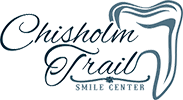What is TMD?
If there is a problem that stops this complex system from carrying out its job, you may experience symptoms of TMD. Issues with your jaw and muscles can lead to severe discomfort, either temporarily or chronically. If you suffer from TMD, you may experience:
- Problems opening your mouth wide.
- Lockjaw.
- Pain or soreness around the jaw joint area, face, and neck.
- Difficulty chewing
- And more.
From tinnitus to headaches, the list of TMD symptoms is a long one. Do yourself a favor by seeking treatment to get past the discomfort.
What Causes TMD?
- Excessive grinding or clenching of teeth
- Arthritis
- Dislocation
- Problems with jaw and tooth alignment
- General stress
Although the causes are numerous, many of those suffering from TMD experience similar symptoms. With a properly constructed, individualized treatment plan, you can achieve relief from the aches of TMD. Our team at Chisholm Trail Smile Center is at your service to help diagnose and treat your TMD, so you can have a healthier smile.
How We Treat TMD?
Your dentist may also recommend some useful changes in your daily habits, such as:
- Practice relaxation techniques to ease jaw tension.
- Stop biting your nails or chewing gum, to avoid unnecessary stress.
- Avoid foods that are too hard or chewy.
Along with these simple fixes, your TMD symptoms may also be reduced by manufacturing a custom-made night guard, usually made of hard plastic. In order to do so, we first capture a mold of your mouth and then shape the material of the oral appliance to custom-fit your bite. These appliances can ease the stress caused by nightly teeth grinding, so you wake up refreshed in the morning.
Here at Chisholm Trail Smile Center, we recommend a combination of treatments as is fit for each individual case. In some instances, we may even refer patients to physicians or orthodontists, in case surgery or further work is needed to provide relief.
